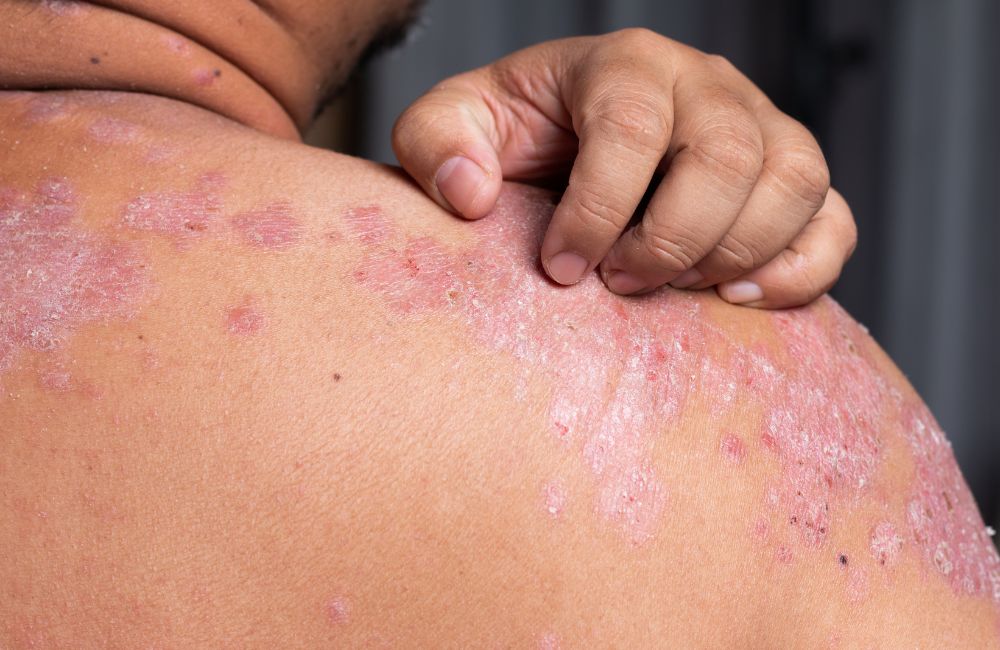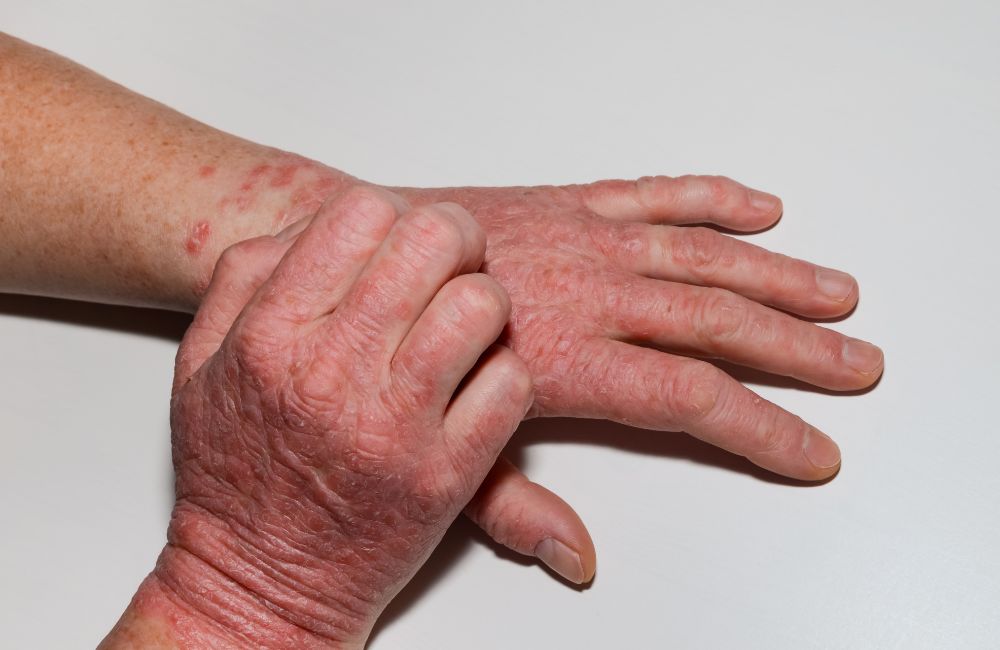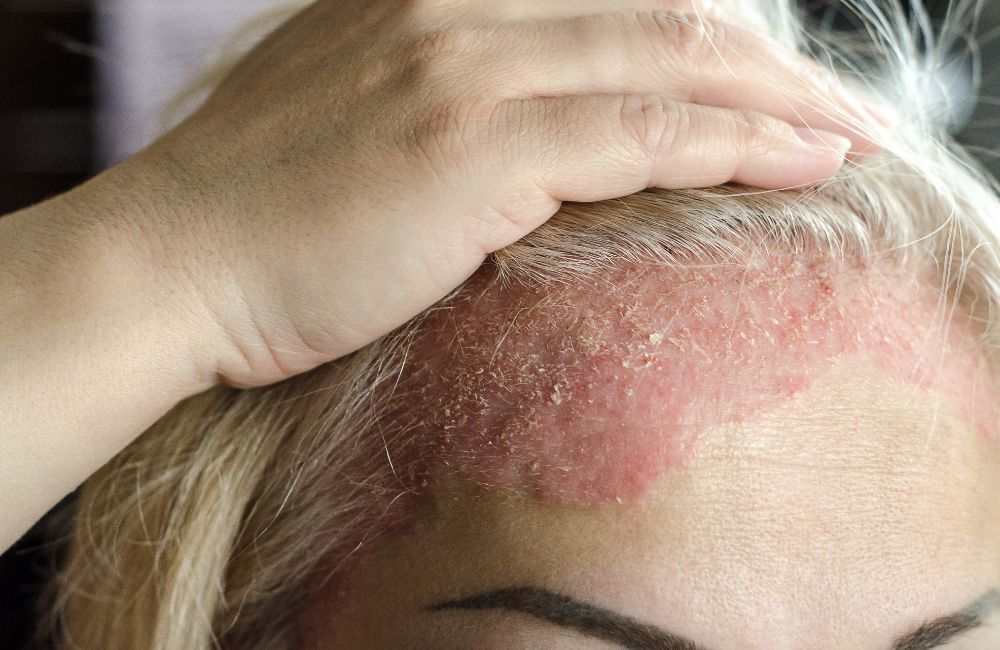
Psoriasis and eczema are common, chronic skin conditions that can significantly impact daily life. Managing these conditions effectively often requires the support of a knowledgeable primary care doctor in Southington, CT. Let’s delve into how your primary care doctor in Southington, CT, can be instrumental in diagnosing, treating, and providing ongoing support for these skin issues.
Comparative Overview of Psoriasis and Eczema
How Your Primary Care Doctor in Southington, CT, Can Help
Treatment Options Available Through Your Primary Care Doctor in Southington, CT
Integrative and Supportive Care
Frequently Asked Questions

Psoriasis and eczema are two prevalent skin conditions often encountered by primary care doctors in Southington, CT. Both are chronic, inflammatory diseases and can impact emotional well-being, leading to stress or self-consciousness, which, in turn, can exacerbate the conditions.
This condition is marked by the rapid buildup of skin cells, which leads to thick, silvery scales and dry, red patches that can sometimes be painful. These patches can appear anywhere on the body but are most commonly found on the scalp, elbows, knees, and lower back. According to studies, more than 8 million people in the US and 125 million people worldwide have psoriasis, around 2 to 3 percent of the total population. An estimated 30 percent of people with psoriasis also develop psoriatic arthritis.
Eczema, or atopic dermatitis, is characterized by dry, itchy skin that can lead to red, inflamed rashes. In severe cases, these rashes may develop into blisters or peels. Common areas affected include the face, back of the knees, wrists, hands, or feet.
31.6 million people, or about 10.1% of the U.S. population, have some form of eczema, and prevalence peaks during early childhood. It is estimated that 1 in 10 individuals will develop eczema during their lifetime, with prevalence peaking in early childhood.
60% of individuals with atopic dermatitis (AD) received a definitive diagnosis within 12 months of initial symptom presentation, while 16% experienced a diagnostic process that took more than two years.
The underlying causes of psoriasis and eczema are complex and not fully understood, but they are believed to involve genetic and immune system factors. Here’s a closer look:
Both psoriasis and eczema have hereditary components. If family members have had either condition, the likelihood of developing it increases significantly.
Psoriasis is considered an autoimmune disorder in which the immune system mistakenly attacks healthy cells, accelerating the skin cell growth cycle. Conversely, eczema is often associated with an overactive immune response to irritants and allergens, which leads to inflammation.
Triggers can vary widely between individuals but typically include:
Trigger | Impact on Psoriasis | Impact on Eczema |
Stress | Can lead to flare-ups or worsen existing patches. | Often exacerbates symptoms, making skin itchier. |
Skin injuries | Scrapes, sunburn, or vaccinations can provoke new psoriatic lesions. | Irritated skin can worsen eczema or lead to infection. |
Certain medications | Beta-blockers, lithium, and antimalarial drugs can induce psoriasis. | Some creams or antibiotics might trigger eczema. |
Environmental factors | Cold, dry weather can dry out the skin further, aggravating psoriasis. | Allergens like dust, pet dander, and seasonal pollen can trigger eczema. |
Weather changes | Similar to environmental factors, harsh conditions exacerbate symptoms. | Heat and humidity can increase itching and sweating, worsening eczema. |
Managing skin conditions like psoriasis and eczema often begins at the office of your primary care doctor in Southington, CT. Here’s how they contribute at each stage:
The process starts when you bring your skin concerns to your primary care doctor in Southington, CT. They will conduct a thorough examination, which includes:
In some cases, where diagnosis isn’t straightforward, your primary care doctor in Southington, CT, may perform additional tests, such as:
Although primary care doctors in Southington, CT, are skilled in managing many aspects of psoriasis and eczema, they may refer you to a dermatologist for specialized treatment, especially if:
Such referrals are coordinated to ensure you receive comprehensive care, optimizing treatment outcomes.
Ongoing management is crucial with chronic conditions like psoriasis and eczema, which often vary in intensity over time. Regular follow-up appointments with your primary care doctor in Southington, CT, allow for:

Managing psoriasis and eczema effectively often requires a multifaceted approach, combining medications, therapies, and lifestyle adjustments. Your primary care doctor in Southington, CT, is well-equipped to guide you through these options to find the most effective regimen for your condition.
Topical medications are the cornerstone of treatment for many skin conditions due to their direct application to affected areas, minimizing systemic side effects. Your primary care doctor in Southington, CT, might recommend:
When topical treatments are insufficient, especially in moderate to severe cases, systemic treatments may be necessary. These are drugs that work throughout the body and can be more potent in managing symptoms:
Phototherapy involves exposing the skin to specific types of ultraviolet light, a treatment that can be arranged through your primary care doctor in Southington, CT:
Lifestyle modifications play a critical role in managing chronic skin conditions and enhancing the effectiveness of prescribed treatments:
Some additional treatments that your primary care doctor in Southington, CT, may discuss include:

Managing chronic skin conditions like psoriasis and eczema involves more than just medical treatments; it often requires a holistic and integrative approach to care. Your primary care doctor in Southington, CT, is crucial in coordinating these additional aspects of your health management.
Beyond traditional pharmaceutical therapies, your primary care doctor in Southington, CT, may recommend various alternative and complementary treatments to enhance your overall well-being and symptom management. These might include:
Connection to community resources is vital for ongoing support and management of chronic conditions. Your primary care doctor in Southington, CT, can serve as a gateway to various local services:
Education is a cornerstone of effective disease management, ensuring patients have the knowledge to make informed decisions about their care:
Yes, petroleum jelly is a highly effective moisturizer for eczema. It helps to lock in moisture and protect the skin barrier, which can be particularly beneficial during eczema flare-ups. Since it’s fragrance-free and doesn’t contain preservatives or additives that can irritate the skin, it’s generally safe for use even on sensitive skin.
Eczema is not typically classified as an autoimmune disease. Unlike autoimmune conditions where the body’s immune system attacks its tissues, eczema is primarily considered an inflammatory disorder. However, it involves a complex interplay of genetic, environmental, and immune system factors. An overactive response by the immune system to various external or internal factors triggers inflammation in eczema. Still, it does not generally involve the immune system attacking healthy body cells, as seen in autoimmune diseases.
Psoriasis can affect anyone but is more commonly seen in adults. It has a genetic component, so individuals with a family history of psoriasis are more prone to developing the condition. Other risk factors include smoking, obesity, and stress.
While no single deficiency causes eczema, specific nutrient deficiencies have been linked to exacerbating its symptoms. Deficiencies in vitamins D and E, zinc, and omega-3 fatty acids can worsen the condition. Vitamin D plays a role in skin health and immune function; lower levels are associated with more severe eczema symptoms. Ensuring a balanced diet with sufficient nutrients can help manage and mitigate eczema flare-ups.
Regular bathing is beneficial for managing psoriasis, but it must be done correctly to avoid worsening the symptoms. Showering or bathing helps to soften and remove scales, calms inflammation and keeps the skin clean. However, water temperature should be lukewarm, not hot, and bathing time should be limited to prevent skin drying. After showering, it is crucial to apply moisturizers to the damp skin to lock in moisture. Gentle, fragrance-free cleansers and avoiding scrubbing the skin harshly are also important to prevent irritation.
Dealing with psoriasis or eczema and seeking effective treatments? Visit Docs Primary Care – Southington, where our skilled primary care doctors excel in managing these skin conditions. From precise diagnosis to customized treatment strategies, we are dedicated to delivering thorough care to help you achieve relief and avoid further complications. Don’t let psoriasis or eczema interfere with your daily life—book an appointment with Docs Primary Care – Southington today and begin your path to improved health.



During this surge in COVID-19 cases, our primary focus is meeting the high demand for tests, and we are seeing higher than usual wait times. This means we are unable to answer most phone calls. Please know that our teams are working very hard during this time to care for as many patients as safely as possible. Please click the button below for answers to common questions. We appreciate your understanding.